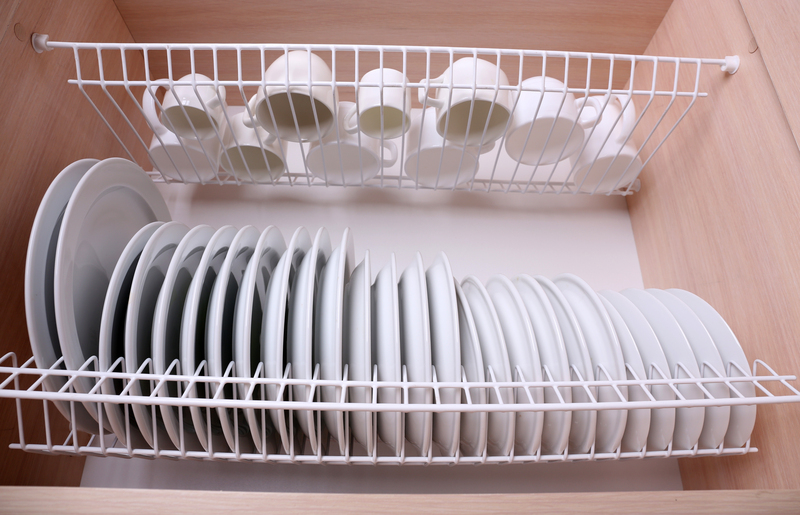Unlock the Secrets of Flawless Velvet Curtain Cleaning
Posted on 02/06/2025
Unlock the Secrets of Flawless Velvet Curtain Cleaning
Velvet curtains add luxury, warmth, and timeless beauty to any room, but their plush texture also attracts dust and dirt. Whether you own antique drapes or brand-new velvet panels, maintaining their grandeur requires careful handling. If you're eager to unveil the mysteries behind perfect velvet curtain cleaning, this comprehensive guide will reveal every tip you need for impressive, lasting results.

Why Does Velvet Demand Special Care?
Velvet's sumptuous, soft pile consists of cut fibers standing upright, delivering its iconic, touchable finish. However, this same luxurious structure is what makes velvet curtain cleaning so challenging. Improper treatments can crush the pile, cause discoloration, or leave watermarks and permanent stains.
- Delicate nap: Velvet's texture can easily lose its plushness with aggressive cleaning.
- Color sensitivity: Dyes in velvet are prone to fading or bleeding if exposed to harsh chemicals or excessive moisture.
- Static attraction: The fabric attracts dust and lint more readily than other materials.
Unlocking the secrets to pristine velvet drapery starts with understanding its unique needs--and knowing the right techniques for care. Whether you're sprucing up bedroom valances or massive living room theater curtains, this guide discloses every method and tip for safe velvet curtain cleaning.
Types of Velvet and Their Cleaning Requirements
Before you jump into cleaning your velvet curtains, it's crucial to determine the type of velvet you own. Each variety of velvet requires a distinct approach:
- Silk velvet: The most luxurious and delicate, silk velvet demands professional cleaning or the lightest hand at home.
- Cotton velvet: Durable yet still sensitive, it may permit gentle at-home cleaning.
- Synthetic velvet: Made from polyester or viscose, these are more resilient but should still not be saturated with water.
- Crushed velvet: Features a pre-crushed look, meaning some marks are less noticeable, but cleaning requirements remain gentle.
Check the manufacturer's label for advice on washing, dry cleaning, or special cautions. When in doubt, opt for professional velvet curtain cleaning services.
Essential Tools and Products for Velvet Curtain Care
Preserving the plushness and hue of your velvet curtains begins with using specialized cleaning tools:
- Soft-bristled brush or lint roller: For removing surface dust, lint, and pet hair without damaging the pile.
- Microfiber cloth: For gentle blotting and stain lifting.
- Handheld vacuum with upholstery attachment: To extract debris without pulling at the fabric.
- Velvet upholstery cleaner: Always test any product on an inconspicuous spot first.
Avoid abrasive sponges or stiff brushes, as these can easily crush or degrade the velvet pile. Use cleaners specifically formulated for delicate materials--and bear in mind that less is always more!
Regular Maintenance for Flawless Velvet Curtains
1. Weekly Dusting
Regular dusting is the first step in keeping velvet curtains beautiful between deeper cleans.
- Use a lint roller or a soft brush to lift dust from the surface gently.
- If using a vacuum, select the lowest suction setting and attach the upholstery tool.
- Gently vacuum with the direction of the pile.
2. Routine Spot Cleaning
Immediate action keeps stains from setting:
- Blot accidental spills immediately with a clean, dry microfiber cloth.
- Do not rub; pressing gently helps absorb liquid without pushing it deeper.
- If needed, use a small amount of mild soap or specialized velvet cleaning solution (always spot test first).
Deep Cleaning Velvet Curtains: The Safest Methods
Deep cleaning ensures your velvet draperies remain plush and stunning, free from trapped allergens or built-up grime. Here are two main options, depending on the fabric's tolerance:
Option 1: Professional Dry Cleaning
For most high-end or antique velvet curtains, dry cleaning is the safest, most effective method. Professional cleaners use solvents that eliminate dirt without soaking the fabric, preventing water stains or distortion.
- Seek professionals experienced with velvet to ensure proper handling.
- Dry cleaning is especially recommended for silk or vintage velvets.
Option 2: Careful At-Home Cleaning
If your curtain label permits, you can hand-wash or gently clean at home. Follow these meticulous steps for optimal results:
- Remove dust and debris with a vacuum or lint roller.
- Fill a tub with lukewarm water and add a few drops of delicate fabric detergent (never harsh chemicals).
- Submerge only if label allows it. Swish gently, avoiding excessive wringing (this can crush the pile).
- Rinse thoroughly with cool water. Squeeze out water by pressing between towels--do not twist or wring.
- Air-dry flat or hang away from direct heat and sunlight.
- Never tumble dry or apply direct heat to velvet.
- Once dry, use a soft-bristle brush to restore the direction and softness of the nap.
Spot Cleaning Stubborn Stains
Some stains may require a tailored approach:
- Red wine or juice: Blot with a mixture of cool water and mild soap. Avoid vigorous rubbing.
- Grease: Sprinkle cornstarch or talcum powder to absorb the oil, then gently brush off before spot cleaning.
- Ink: Dab gently with a clean cloth moistened with rubbing alcohol, then blot dry immediately.
How to Restore Velvet's Signature Luster
Even with careful cleaning, velvet can appear flat or crushed. Revitalize your velvet curtains using these tried-and-true techniques:
-
Steam gently:
Hold a handheld steamer or the steam output of an iron (never direct heat) several inches from the fabric to relax and lift the pile.
- Tip: Always keep the steamer moving and avoid touching the fabric directly with hot surfaces.
- Brush the pile: Use a soft velvet brush or clothes brush, working in the direction of the nap. This restores natural texture and shine.
- Hang properly: Hang curtains straight from the rod to encourage creases and crushed spots to relax naturally with gravity.
Preventing Damage: Common Velvet Curtain Cleaning Mistakes
- Over-wetting the fabric: Too much water leads to stubborn watermarks and shrinkage.
- Using harsh cleaning products: Bleach, ammonia, or standard upholstery cleaners can irreparably harm velvet fibers.
- Applying direct heat: Ironing or using a hair dryer can flatten the pile and scorch the fabric.
- Ignoring regular dusting: Built-up debris embeds in the nap and dulls velvet's sheen.
Careful attention to these pitfalls is essential for unlocking the long-term splendor of your velvet window dressings.

Frequently Asked Questions About Velvet Curtain Cleaning
Can I machine wash velvet curtains?
Most velvet curtains should not be machine washed, as the agitation and excess water can damage the nap and cause shrinkage. If your velvet is made from wash-friendly synthetic fibers and the care label explicitly allows, wash on a gentle, cold cycle using a mesh laundry bag--but air-dry only!
How often should I have velvet curtains professionally cleaned?
Most households find that annual or biannual professional cleaning is sufficient for velvet curtains. If exposed to heavy pollution, smoke, or dust, consider cleaning more often.
What can I do to minimize dust on velvet drapes?
Regular vacuuming, using an air purifier, and keeping nearby windows and vents clean can reduce dust buildup. Weekly maintenance keeps your velvet looking fresh and vibrant.
Are there eco-friendly options for velvet curtain care?
Absolutely! Many dry cleaners offer green, solvent-free cleaning. At home, use mild, biodegradable detergents, and minimize water and chemical usage for a safer approach.
Final Thoughts: The Secret to Flawless Velvet Curtain Cleaning
Unlocking the secrets of flawless velvet curtain cleaning doesn't require magic--just careful methods, the right tools, and regular attention. By taking a proactive approach with gentle dusting, prompt spot cleaning, and periodic professional care, your velvet curtains will remain a stunning feature in your home for years to come.
- Always follow care labels and test products in discreet areas.
- Embrace weekly dusting as part of your cleaning routine.
- Use specialized products and avoid moisture overload.
- Restore velvet's luster with steaming and gentle brushing.
With these proven tips for velvet curtain maintenance, you'll enjoy a home that's as elegant as it is inviting--no matter how busy life gets. Start today, and unlock the secret to show-stopping velvet drapes that look flawless every day!
Latest Posts
Unlock the Secrets of Flawless Velvet Curtain Cleaning








